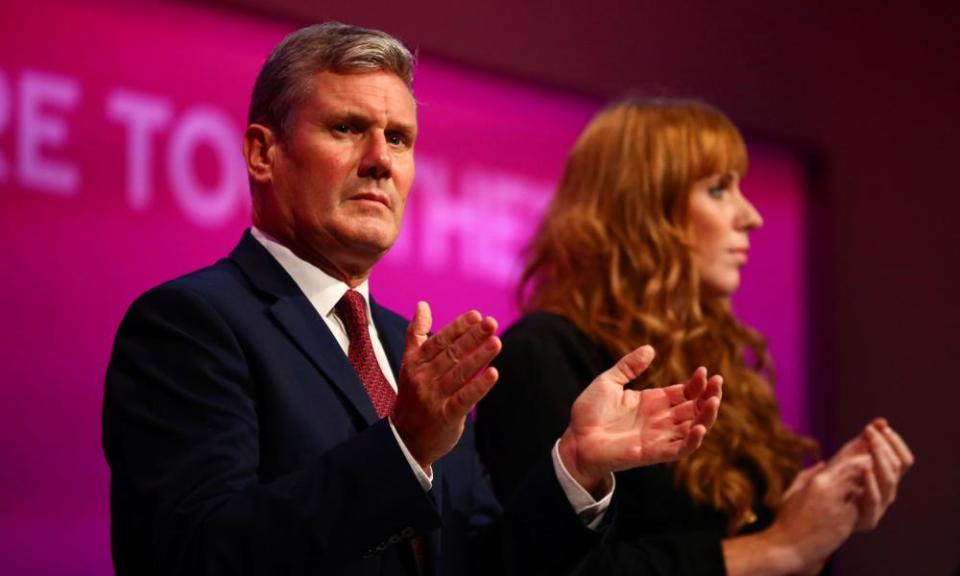Labour must use this conference to go further in rooting out antisemitism

As the Labour party conference begins in Brighton, I find it difficult to avoid a feeling of trepidation.
The last few Labour conferences to take place in person were all marked by incidents that appeared to indicate to most Jews that they were extremely unwelcome. Whether that was the then Unite general secretary Len McCluskey in 2017 dismissing antisemitism within Labour as “mood music created by people trying to undermine Jeremy Corbyn”, or the sight of Luciana Berger in 2018 being accompanied by police protection, or the antisemitic posters and flyers outside the conference centre in 2019, the atmosphere has felt markedly unpleasant for many Jewish people.
But the political scene has changed somewhat since then. McCluskey’s successor at Unite has made it clear her top priority is workers’ rights, rather than trolling Jews. Within five months after the 2018 conference, Berger said she felt she had no choice but to leave Labour, which brought dismay to all decent members. Now, by contrast, the party has bid good riddance to some of those involved in the promotion and dissemination of the 2019 antisemitic posters and flyers.
Of course, this is Labour’s first in-person party conference under new leadership – and the first since the publication of the report by the Equalities and Human Rights Commission into Labour antisemitism last October.
That report was damning. As well as finding examples of “harassment”, “discrimination” and “political interference in the handling of antisemitism complaints”, the EHRC said that “equally of concern was a lack of leadership within the Labour party on these issues, which is hard to reconcile with its stated commitment to a zero-tolerance approach to antisemitism… it is hard not to conclude that antisemitism within the Labour party could have been tackled more effectively if the leadership had chosen to do so”.
Keir Starmer has made a different choice. In his first speech as Labour leader, he vowed to “tear out the poison” of antisemitism that had seeped into the party. Since the EHRC report, the party has worked with representatives of major UK Jewish communal organisations like ours to ensure its response to the report – and its legally mandated recommendations – do not ignore the Jewish community’s concerns.
Today, Labour delegates will be asked to vote on an amendment to institute a new independent complaints process for the party – not just for antisemitism cases, but for all complaints. As well as being a legally mandated requirement from the EHRC, it also makes clear sense for all Labour factions to support it, since it will prevent any party leadership – whether left or right – interfering in the complaints process for factional reasons.
Jewish members and non-members faced denial, downplaying and distortion from people at all levels of the party
It is hardly a secret that Jewish support for Labour plummeted under the previous leadership. Jewish members and non-members faced not just antisemitism, but denial, downplaying and distortion from people at all levels of the party. We saw self-described “lifelong anti-racists” parroting antisemitic conspiracy theories originally promoted by the Nazis and the KKK. We saw the wielding of the “Livingstone Formulation” – the dismissal of even the most egregious antisemitism with claims that those who complained about it were just seeking to silence criticism of Israel. We saw attacks and threats against Jewish individuals and organisations, including the Board of Deputies of British Jews. It was a uniquely painful time; not just because the bigotry aimed at us, but because we saw just how many chose to ignore anti-Jewish racism in favour of pursuing a nebulous “greater good”.
Labour now has an opportunity to take a further step away from that moral and intellectual abyss. We commend the leadership’s efforts in this regard and hope in the future that we will be able to look back on this year’s conference as a point where the party amplified its efforts to properly turn the page on a very grim period of its recent history.
Marie van der Zyl is the president of the Board of Deputies of British Jews

 Yahoo Finance
Yahoo Finance 